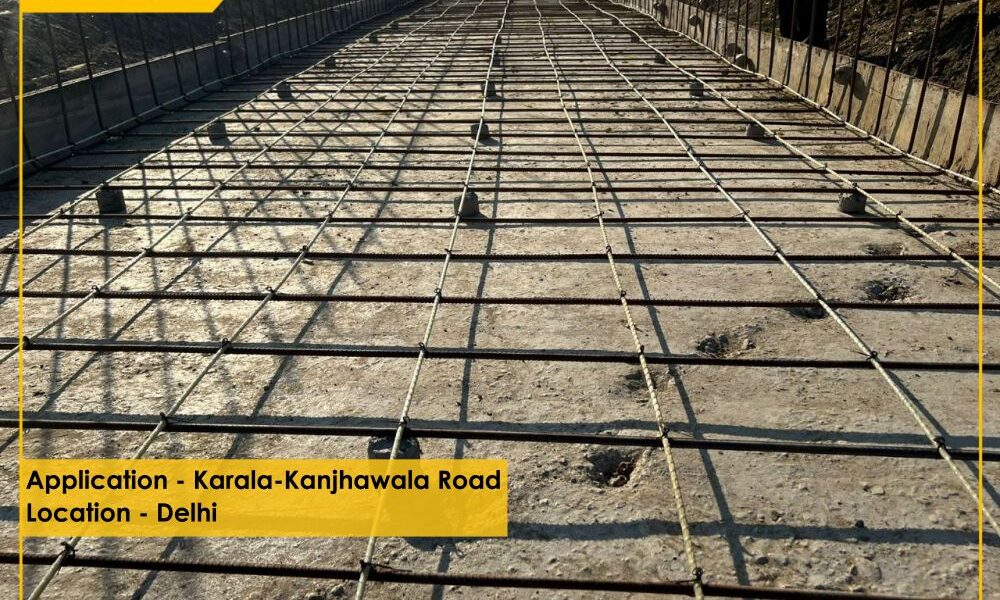Construction of Six Lane Karala Kanjhawala Road 15000 Km Delhi
Challenges Faced
Corrosion Concerns:
The corrosive environment, primarily due to high humidity levels and constant exposure to de-icing salts, significantly deteriorated the road infrastructure. Traditional steel rebar rusted quickly and weakened structurally, which required frequent repairs and posed a safety risk.
Heavy Load Bearing Requirements:
The National Highway requires reinforcement bars that can withstand heavy traffic loads, including commercial trucks and high-speed vehicles. GFRP Rebar completes high tensile strength while maintaining structural integrity over time.
Cost and Time Constraints:
We had to work within a strict budget and a tight timeline. Our aim was to find a cost-effective solution that minimized both initial installation costs and long-term maintenance expenses.
MRG Composites Rebar's Solutions
Introduction of GFRP Rebar:
We provided an innovative solution with GFRP rebar, which offered several advantages over traditional steel rebar. GFRP rebar is corrosion-resistant, eliminating the issues associated with rusting and ensuring the highway's longevity even in harsh environmental conditions.
Lightweight and Easy Installation:
GFRP rebar is significantly lighter than steel, which reduces transportation and handling costs. It also helps in faster installation, helping us stay on schedule and within budget. The reduced weight made it easier to maneuver and place, improving worker safety and efficiency.
Superior Strength and Durability:
GFRP rebar has a higher tensile strength than steel, providing superior load-bearing capabilities essential for a national highway. Additionally, GFRP does not suffer from fatigue like steel, making it a more durable option for long-term infrastructure projects.
Project Outcome
We completed the installation of GFRP rebar on the Karala-Kanjhawala Road segment of National Highway 1 ahead of schedule and within the allocated budget. The new infrastructure now boasts enhanced durability and resistance to environmental degradation, effectively addressing the corrosion issues that plagued the previous construction.
By using GFRP rebar, we have significantly increased the projected lifespan of the highway, reducing the need for frequent repairs and minimizing traffic disruptions. This has resulted in a smoother driving experience for motorists and has contributed to the overall safety and reliability of the national highway network.
Key Takeaways
Enhanced Durability and Longevity:
GFRP rebar has proven to be a superior alternative to steel, offering enhanced resistance to corrosion and environmental factors, which is crucial for infrastructure in challenging conditions.
Cost-Effective Over the Long Term:
By reducing maintenance needs and extending the lifespan of the highway, GFRP rebar offers significant cost savings over time, despite a potentially higher upfront investment.
Efficiency in Construction:
The lightweight nature of GFRP rebar not only reduces transportation and handling costs but also speeds up the installation process, allowing projects to stay on schedule and within budget.
Improved Safety and Performance:
The high tensile strength and fatigue resistance of GFRP rebar provide a more robust infrastructure solution, enhancing the safety and performance of roadways subjected to heavy traffic loads.
Conclusion
Our successful implementation of GFRP rebar in the Karala-Kanjhawala Road segment of National Highway 1 showcases MRG Composites Rebar's commitment to innovation and quality. By choosing GFRP rebar, we demonstrated that superior materials can significantly enhance infrastructure durability, reduce maintenance costs, and ensure the long-term safety and reliability of our roadways.
MRG Composites Rebar continues to lead the way in providing advanced reinforcement solutions, setting a new standard for the construction industry.




